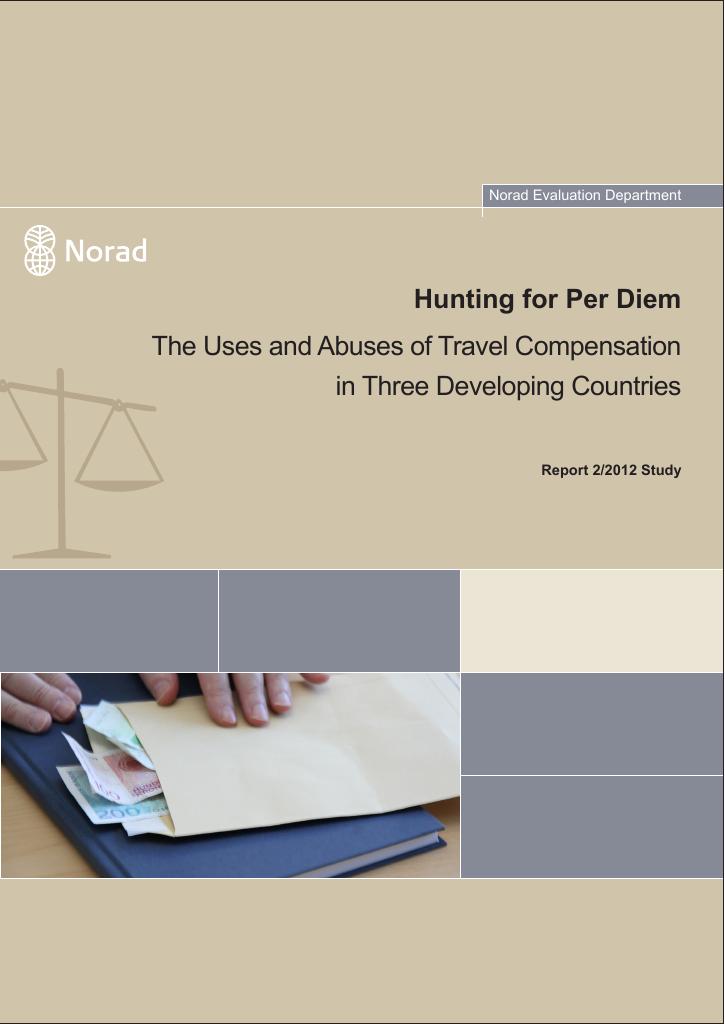Evaluering
Hunting for Per Diem: The Uses and Abuses of Travel Compensation in Three Developing Countries
Cash is a great incentive. The last decade has seen a boom in variousforms of cash incentive programmes, from the conditional cash transferprogrammes that emerged in Latin America in the late 90’s, providingcash to budget-constrained households conditional on sending childrento school and for health check-ups, through to results-based financingand cash-on-delivery programmes, very much in vogue today, wherebygovernments only receive funding when they can show an agreed-uponprogress on certain outcomes and results. While the incentives usuallywork, the potential adverse and unintended effects need to be kept aneye on; fertility rates may increase as a result of cash per child, sectorresults not in the government-donor contract may be neglected. Whenthe compensation employees of public and private organisations get forextra expenses incurred when on workshops and seminars away fromtheir normal duty station is substantially larger than their actual expenses,such per diems or allowances gain the same role as ‘conditional cash’.And while it does ensure an incentive to attend such events, it equallyprovides a number of potentially perverse incentives. Capacity building is a central concern of development efforts in general,and in Africa in particular. A large portion of development aid is spent onseminars and workshops to enhance competence and efficiency in stateadministrations as well as in civil society organisations. While there canbe little doubt that the government staff, NGO staff and civil societyemployees attending such training and awareness-raising events learnsomething and upgrade their skills, the effectiveness of these workshopsis a sadly understudied and underreported area. While the effectivenessof training-workshops is likely to be the subject of a future researchprogramme of Norad’s Evaluation Department, this study focuses on thepotential abuses of the current mix of per diem and allowances systems. This report is all the more timely as the last decade has seen a rapidincrease in the amount of donor funds allocated to allowances and perdiem in connection with seminars and workshops. The study makes anassessment of the origins, operation and potential consequences of perdiem compensation with particular reference to effects on developmentprogrammes, national budgets and civil service delivery. What are some of the unintended and unwanted consequences of thecurrent allowances systems? Who are the key external and local actorsamong donors and government driving the allowances and per diemphenomenon? Can the positive aspects of per diems be retained whileminimising the potential negative consequences? Ethiopia, Malawi andTanzania were selected as country cases. The study shows that there is a variation in the three countries withregard to the way the per diem and seminar systems operate, openingup the possibility for a variety of methods for misuse or non-optimal useof the money that has been allocated for seminars. The study has no conclusive evidence of the precise magnitude of the perdiem problem but gives important insights into the potential for misuse,and contains a number of recommendations on how donor organizationsand governments can promote a collective approach to improve on thecurrent systems. Oslo, April 2012Marie Moland GaarderDirector of Evaluation
Publisert
Eier
Norad
Utfører
Chr Michelsens Institutt
Forfattere
Tina Søreide, Arne Tostensen og Ingvild Aagedal Skage
Språk
engelsk
Kilde
ISBN
9788275486453
